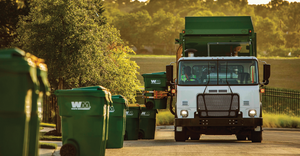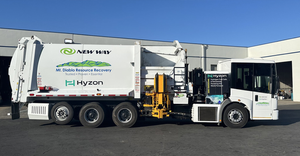Austin, Texas, Supports a Circular Economy with New Incubator
The incubator will help entrepreneurs provide solutions that contribute to a zero waste world and solve global challenges in both design and reuse.
The Austin, Texas, Economic Development and Austin Resource Recovery (ARR) departments recently announced a partnership with the Austin Technology Incubator (ATI) to launch a new Circular Economy Incubator in the area. ATI is now one of only three circular economy incubators in the country.
“Austin Technology Incubator and the city of Austin have had a partnership for over two decades to support startups,” says Natalie Betts, recycling economic development program manager for the city of Austin. “In our latest agreement, we wanted to specifically support an industry that was a growing focus for the city—circular economy—so, the addition of a Circular Economy Incubator to ATI was included.”
The incubator will support entrepreneurs and startups whose mission is to provide solutions that contribute to a zero waste world and solve global challenges in both design and reuse.
“Technology—preferably based on a scientific discovery or engineering innovation—plays a key role in the incubator program,” says Betts. “ATI can help entrepreneurs without a technology service model by making connections; however, they wouldn’t be a good fit for the ‘technology’ incubator.”
The Circular Economy Incubator is an incubation portfolio of entrepreneurs working with circular economy technology and business model innovations within ATI that connects them with academia, industry and government to scale their business.
Austin Technology Incubator is part of the University of Texas at Austin, but any company can apply. Entrepreneurs can fill out an application on the ATI website.
“ATI encourages anyone who needs help—all entrepreneurs or startups with a circular economy idea—to get in touch as they will help point them in the right direction for assistance, regardless if they are a fit for joining the incubator or not,” says Betts. “Entrepreneurs and startups should reach out if their technology has a social good or positive impact on the world. Many companies are not necessarily thinking of their ventures as circular economy players and could benefit from a conversation and coaching in that arena.”
The Circular Economy Incubator will develop a network of investors, mentors and other partners specifically focused on circular economy and resource efficiency and tailored to the needs of circular economy startups.
“To receive help from ATI, a company just needs to be related to one if its portfolio areas—circular economy, energy, health, water, mobility or food,” says Betts. “To join the incubator, companies should be beyond the idea stage of their business and have a technology that is based on engineering innovation or scientific discovery.”
The importance of a circular economy is not new for the city of Austin, which created a Recycling Economic Development Program in 2013 as a joint effort between the city’s Austin Resource Recovery and the Economic Development Department and offers a range of assistance for businesses in the recycling, reuse and waste reduction industry.
Austin Resource Recovery was an early supporter of and partner with Smarter Sorting, an Austin-based company that helps retailers and municipalities solve complicated waste management and reverse logistics challenges. The company has developed a suite of patented products and cloud technologies that it deploys across three interrelated, highly regulated verticals.
“It is realistic to say that our company and our solution would never have been built if ARR did not allow us to use their facility as the testing ground for our methods and technologies,” says Chris Ripley, co-founder and CEO of Smarter Sorting. “Our existence, and our success, is an amazing example of what happens when cities are incentivized to pursue public and private partnerships and are given the space to experiment when seeking solutions to vexing problems.”
Smarter Sorting enables the circular economy by helping its customers identify items at the end of their lifecycles.
“When you know the ‘where’ of a specific item, and our technology enables an immense amount of market and regulatory logic to be applied to each item at the point of identification, a world’s worth of management options are unlocked,” says Ripley. “By applying high level data and information to each product, we enable our customers and all of their employees to be partners in the process of maximizing every single item’s value.”
This means Smart Sorting helps customers turn waste into product and achieve their zero waste goals.
“However, our larger vision is that by tracking everything all the time, we create opportunities for waste items to be viewed as assets that can be reused, recycled, upcycled, rebuilt and/or salvaged, creating a scenario where only items that absolutely must be managed as waste become waste,” says Ripley.
The Circular Economy Incubator allows the city to offer a unique program that will help Austin’s existing circular economy businesses to scale and encourage circular economy entrepreneurs from all over the country or world to choose Austin to build their business. ATI also provides internship opportunities for local students, so the program will help train more young talent on the value and necessity of transitioning to a circular economy and how to realize it through business innovation.
“We hope that our initiative will inspire others to add circular economy-focused startup support programs like incubators and accelerators,” says Betts. “We would be happy to talk to any other cities who are interested in launching their own incubators and share our experience.”
About the Author
You May Also Like


